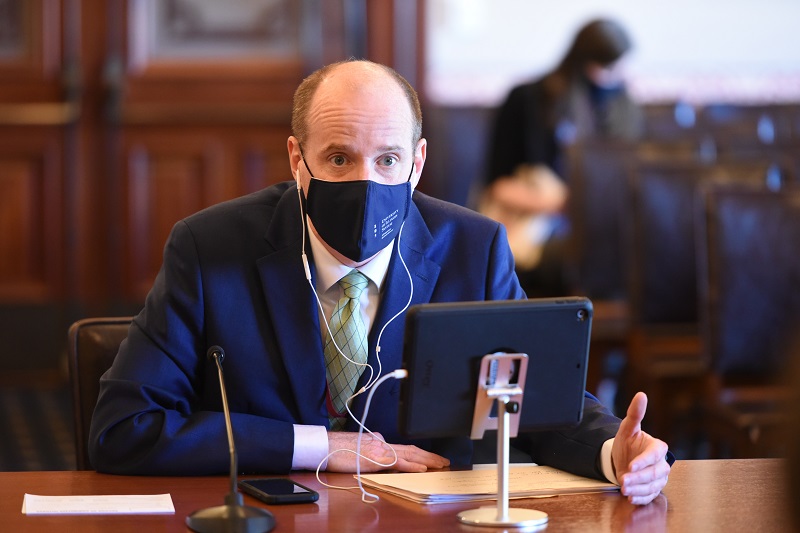- Details
- Category: Press Releases
 SPRINGFIELD – State Senator Bill Cunningham’s legislation to help turn vacant lots from problem areas into urban farms and community gardens passed the Senate Local Government Committee Tuesday.
SPRINGFIELD – State Senator Bill Cunningham’s legislation to help turn vacant lots from problem areas into urban farms and community gardens passed the Senate Local Government Committee Tuesday.
“Many of our older communities find themselves with vacant, neglected lots in city centers and older neighborhoods,” said Cunningham, a Democrat who represents portions of Chicago and the southwest suburbs. “In many cases, the local government becomes responsible for these lots, and this plan would give them a clear path to turning them from sometimes-dangerous eyesores into farms or gardens that increase property values and engage the community.”
The legislation enables local governments to sell or lease government-owned vacant lots to non-profit groups for the purpose of urban agriculture, specifically allowing them to grant leases of up to 25 years (with 25-year renewals possible) or to sell vacant tracts of land for less than they would normally cost, providing the land continues to be used to grow food and/or sell food grown by the non-profit.
- Details
- Category: Press Releases
 SPRINGFIELD – State Senator Bill Cunningham has introduced legislation making it easier for local governments to sell or lease city-owned vacant lots to not-for-profit groups that want to start urban farms and community gardens.
SPRINGFIELD – State Senator Bill Cunningham has introduced legislation making it easier for local governments to sell or lease city-owned vacant lots to not-for-profit groups that want to start urban farms and community gardens.
“Making it easier to turn vacant lots into small-scale urban farms or community gardens solves several problems at once,” said Cunningham, a Democrat who represents portions of Chicago and the southwest suburbs. “It repurposes city-owned lots that are sitting vacant. It helps increase access to healthy fruits and vegetables. And, because this program would be targeted at not-for-profit groups, it helps increase community involvement and create new volunteer opportunities.”
The legislation specifically allows local governments to grant leases of up to 50 years (with 25-year renewals possible) or to sell vacant tracts of land for less than they would normally cost, providing the land continues to be used to grow food and provide recreation opportunities.
- Details
- Category: Press Releases
 SPRINGFIELD – During the first peak of the COVID-19 pandemic last spring, the Illinois General Assembly passed a law offering additional workers’ compensation protections to first responders and essential workers. Today, the governor signed State Senator Bill Cunningham’s measure to extend those protections by six months.
SPRINGFIELD – During the first peak of the COVID-19 pandemic last spring, the Illinois General Assembly passed a law offering additional workers’ compensation protections to first responders and essential workers. Today, the governor signed State Senator Bill Cunningham’s measure to extend those protections by six months.
The law allows essential workers and first responders to file for workers’ compensation benefits if they contract COVID-19 during the course of their employment – providing them with additional economic support while they recover from the illness. Employers have an opportunity to rebut workers’ claims by demonstrating they followed all applicable public health guidelines.
“We’ve asked first responders and frontline workers to repeatedly put themselves in harm’s way to protect us throughout the pandemic,” said Cunningham, a Democrat who represents portions of Chicago and the southwest suburbs. “I’m proud Gov. JB Pritzker has signed the law to ensure that we, in turn, protect first responders and frontline workers, should they contract the virus while on the job.”
- Details
- Category: Press Releases
Cunningham encourages local business owners to take advantage of PPP changes
 CHICAGO – State Senator Bill Cunningham wants to make sure local entrepreneurs are aware of recent changes to the federal Paycheck Protection Program, meant to make the program more accessible to smaller businesses.
CHICAGO – State Senator Bill Cunningham wants to make sure local entrepreneurs are aware of recent changes to the federal Paycheck Protection Program, meant to make the program more accessible to smaller businesses.
“The PPP program has been a great opportunity that has helped many of our local small businesses stay afloat, but it was hard to access for some of our smallest business owners,” said Cunningham, a Democrat who represents portions of Chicago and the southwest suburbs. “If you looked into the program before but decided you didn’t qualify or wouldn’t be able to fill out the paperwork, it’s worth looking again after the recent changes.”
The Biden administration recently changed the loan calculation formula to make it easier for sole proprietors, independent contractors, and the self-employed to qualify for relief. They’ve also established that student loan debt and prior incarceration will no longer prevent small business owners from obtaining relief.
More Articles …
- Cunningham introduces legislation to help older adults and people with disabilities stay in their own homes
- Cunningham encourages eligible residents to sign up for COVID-19 vaccine
- Cunningham congratulates Lake Katherine Nature Center on grant to support local students
- Cunningham passes measure extending workers’ comp protections
Page 22 of 72



